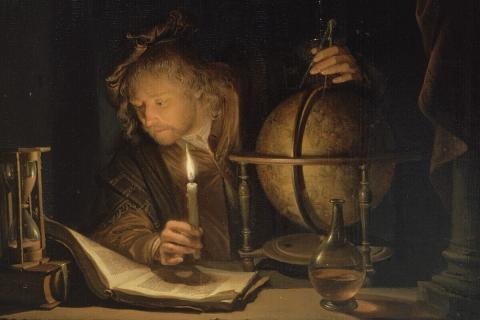
We live in an enchanted world, charged by God's grandeur. In order to reclaim a sense of wonder, we need to see the ordinary as extraordinary, grateful for the gift of existence itself.
Today’s technology dominates our intrigue with the latest advances in science and engineering. We marvel at the ways in which computers and electronic devices wirelessly synchronize our e-mail, social media posts, music playlists, and contact information. This synchronization improves with greater speed as each new generation of technology provides faster and more reliable service. Yet as impressive as these advances are, our amazement at this technology is transitory as we grow complacent and eventually demand more impressive features. This amazement also focuses on the latest achievements of engineers, upon that which is man-made. True wonder should surpass this world and lead us into the transcendent, into the eternal realm of God whose splendor never fades nor seems routine.
As our intrigue for technology increases, our capacity for wonder seems to fade proportionally. We grow curious about what is possible through human craft, while failing to delight in what is already created by God. How many have held a new cell phone and were captivated by its arresting beauty? Who has unpackaged a new electronic tablet and allowed themselves to be lost in wonder about the source of such a device? No one contemplates engineers with a sense of awe, nor their products. Electronic technicians do not evoke bewilderment. Yet God does, if we allow ourselves to peer beyond this world into the source of all that is.
In order to reclaim a sense of wonder, there is need to see the ordinary as extraordinary. We live in an enchanted world, charged by God’s grandeur and inhabited by beings both physical and spiritual. Yet to see the extraordinary qualities that surround us, one must not take for granted the gift of existence itself. For the fact that there is anything created when there could be nothing, should astound us. Why is the Pacific sky arrayed with pale colors each evening with the setting sun? Why does a forest soar up into sky, seemingly reaching to heaven in exuberant praise? Why are we allowed to enjoy these expressions of beauty? To miss these elements is to miss the handiwork of God and our connection to Him.
In recognizing the extraordinary hidden within the ordinary, we should be moved toward gratitude and praise for the Creator. Wonder in the face of arresting beauty should lead us to thank the One who created such beauty. For our interior life is capable of much more than simply delighting in our own experience of wonder and awe. Our desire for truth and for personal connection should drive us to discover the source upon which all delights are made and how we can remain connected to that source, despite our own limitations.
Reclaiming the ability to see the ordinary as extraordinary prevents us from viewing the world as dull and life as a series of disappointments. Furthermore, in noticing the natural ways in which God reveals Himself within the splendor of this world, we are better equipped to note the subtle ways in which He reveals Himself through supernatural means.
To recover a sense of wonder and awe, a cue can be taken from the early twentieth-century English journalist, G. K. Chesterton. Though an impressive adult with a towering list of professional accomplishments, Chesterton preferred to live in the world of children—that is, in the realm of imaginative wonder that fills the minds of youth. As he wrote in his Autobiography, “What was wonderful about childhood is that anything in it was a wonder. It was not merely a world full of miracles; it was a miraculous world.” Appreciating the world’s impressive existence and explosive color was an ability that Chesterton maintained throughout his life. It was also an ability that many of his contemporaries had lost. For in their sophistication, they sacrificed the joys of their childhood for the common attitude that grows tired of this world, seeking stimulation instead from the next fad or thrill. Yet Chesterton realized that “the great and glorious privilege of being exceptional is that such a person can admire the ordinary” (Notebook).
As our Lord instructs, “Unless you turn and become like children, you will not enter the kingdom of God” (Matthew 18:3). Our salvation involves a humble reliance upon our heavenly Father. Yet as Chesterton realized, it also includes a return to our childlike sensibilities in which the world can still startle and amaze us. If we lose our capacity to appreciate the splendor of this world, how will be ever found worthy to enjoy the majesty of the heavenly world to come? Perhaps the thing we need most is not more advances in science and technology, but a renewed appreciation for the Creation that already surrounds us.

